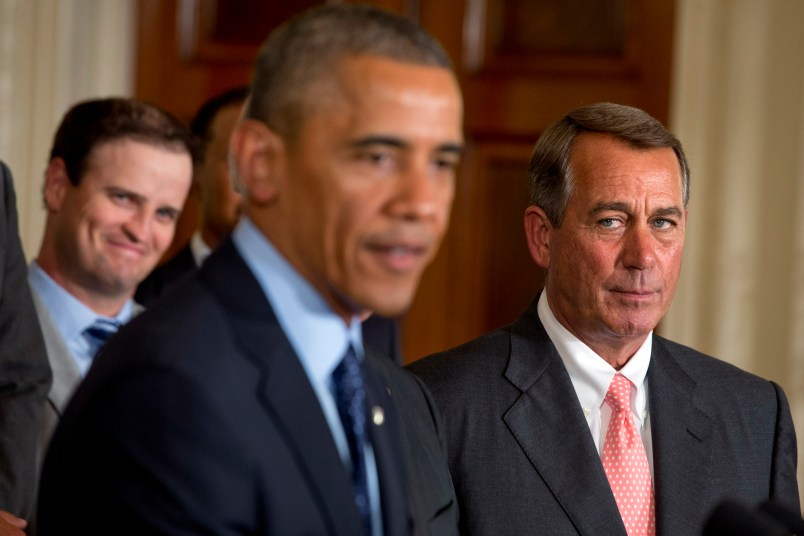House Republicans escalated their confrontation with President Barack Obama on climate change Tuesday with the release of government funding legislation that reverses the administration’s new rules to limit coal pollution.
The legislation, released by the House Appropriations subcommittee on interior and environment, is one of 12 appropriations bills to keep the government running when money expires on Sept. 30.
It targets the regulations on coal-fired power plants, proposed last month by the Environmental Protection Agency in an ambitious effort to reduce climate-warming carbon emissions by 30 percent by 2030 (compared to 2005 levels).
“This bill also protects Americans from the onslaught of job-killing regulations coming from the EPA, and makes difficult decisions to carefully balance national priorities,” Rep. Ken Calvert (R-CA), the chair of the subcommittee, said in a statement.
Page 129 and 130 of the bill state: “None of the funds made available by this Act shall be used to propose, finalize, implement, or enforce” any regulation under the two key sections of the Clean Air Act “establishing any standard of performance for emissions of any greenhouse gas from any modified or reconstructed source that is a fossil fuel-fired electric utility generating unit.” The sections, 111(b) and 111(d), are the ones that the EPA cited as legal justification for its carbon pollution standards.
House Appropriations Chairman Hal Rogers (R-KY) said “this legislation contains important provisions to rein in the harmful regulatory overreach of federal bureaucracies that will unnecessarily cause job loss and that will weaken our recovering economy.”
EPA spokeswoman Liz Purchia confirmed that the GOP legislation targets the agency’s emissions standards on coal-fired power plants, and defended the regulation.
“Clean air should not be a political issue. Both sides of the aisle want clean, safe air for their children. We are just doing our jobs … to protect public health and the environment,” EPA spokeswoman Liz Purchia said. “We proposed the Clean Power Plan because it’s the right thing to do to protect public health. It will protect our families’ health today and for future generations in a way that supports innovation and a strong, growing economy.”
House Republicans signaled in June that they’d seek to use the appropriations bill to reverse the EPA rule. As TPM reported recently, there is strong enthusiasm among Senate Republicans for doing the same thing. Senate Democratic leaders have sought to preserve the regulations during the messy appropriations debate against Senate Minority Leader Mitch McConnell’s (R-KY) efforts to derail them. If both sides stick to their guns, it could set the stage for another partial shutdown of the federal government on Oct. 1.
The White House strongly supports the regulations, viewing them as a core element of Obama’s presidential legacy. It recently warned Republicans not to risk another shutdown this fall for the purpose of “protecting the profits of big polluters.”
Many lawmakers and aides believe the appropriations process is destined to fail on account of policy disagreements, and that Congress will resort to a stopgap bill (known as a continuing resolution) to keep the government running, as it has many times before.
Either way, the escalated confrontation requires one side to back down and agree to fund the government without getting what they want on the climate change rules. With the Senate and White House in Democratic hands, the deck is stacked against Republicans. It’ll ultimately be left to House Speaker John Boehner and McConnell to decide how hard to fight this battle.







Perhaps they can pass a law that changes physics so that global warming doesn’t happen. Maybe they could reverse gravity while they’re at it.
This is the exact same time-wasting House sponsored legislation that did so well in repealing Obamacare, and THAT bill went on for more than 50 votes! I predict exactly the same result here.
Or maybe the House will never bother to bring this to a vote, the Republicans will just use it to raise money from coal and oil industries for the 2014 elections. That’s all this is. Let’s be clear; election year politics, not serious legislation, what the Republican House does all the time.
nothing like confirming the stereotype that you are the “party of NO”
At least they’re doing something, wrongheaded as it may be.
Yes, GOP. Shut down the government in protest over clean air for kids in October of an election year.
Come on, fuckers. I know you’re stupid enough to pull the trigger.
Pull it.